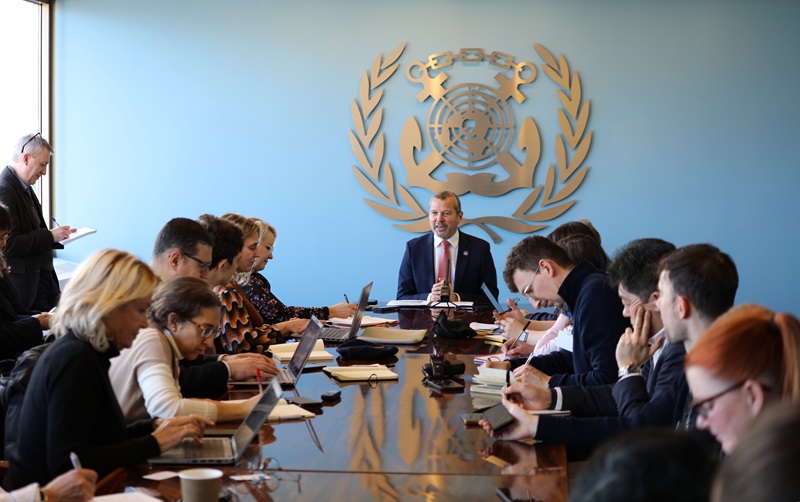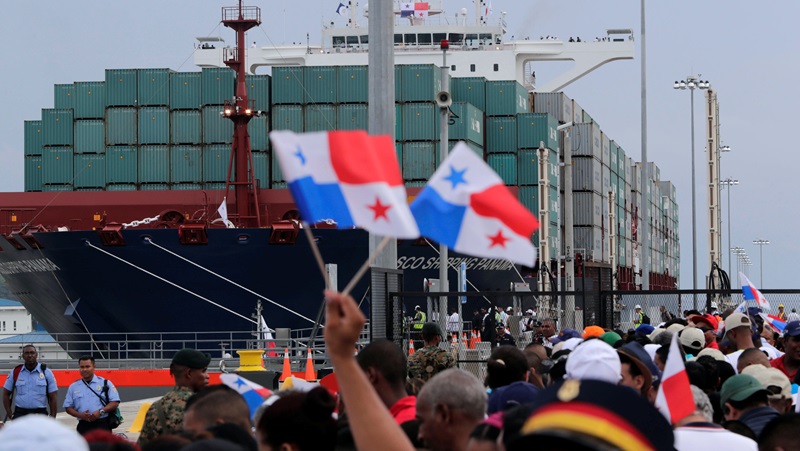The number of governments backing a proposal for a global levy on maritime emissions has grown, according to the head of the United Nations shipping body, in a shift celebrated by Pacific island states which are particularly vulnerable to climate change.
“You will see that an increased number of member states are now adding their support for the levy,” Arsenio Dominguez, secretary-general of the International Maritime Organization (IMO), told journalists at its London headquarters on Tuesday.
Shipping-reliant nations like Panama and Liberia have joined the European Union, UK, Japan, Nigeria, Kenya and others in backing the Pacific islands’ proposal for a levy on ships’ emissions.
Veteran Pacific shipping negotiator Albon Ishoda, the Marshall Islands’ special envoy for maritime decarbonisation, said support from Panama and Liberia was a “milestone in our collective journey” and “validates the Pacific’s enduring efforts to champion ambition and equity”.
Price on all emissions?
At upcoming talks in London in February and April, governments will debate whether to impose a levy on all of a ship’s emissions or only to introduce a fuel standard.
A levy would force ship owners to pay for every tonne of greenhouse gases their vessels emit, making the use of more polluting fuels – like today’s oil-based bunker fuel – more expensive. It would incentivise the use of lower-emitting fuels like ammonia, biofuels, methanol and hydrogen.
A fuel standard, which most countries already agree on, would see ship owners pay for emissions only above a certain level. Owners of ships emitting below this level could potentially sell licenses to those emitting above it, enabling them to continue polluting. This would incentivise shipowners to use cleaner fuels or to save fuel by sailing slower.
On Tuesday, Dominguez said he was optimistic that agreement on whether to have a levy, fuel standard or both would be found in April and signed off at the next set of IMO talks in October.

Arsenio Dominguez speaks to journalists at International Maritime Organization headquarters on January 14 2024 (Photo: IMO)
Details to come later
Negotiations on how much a levy should be, and what it should be spent on, are likely to take longer but the IMO aims to have any measures in place by 2027.
Ahead of the February 17-21 talks, governments have submitted proposals on how a levy – which could raise over $100 billion a year, according to UN estimates – should be designed.
A proposal put forward by the broad group of levy backers unanimously recommends that some of the money should be given to ships powered by clean fuels and used to research and develop these fuels and the port infrastructure required to use them.
It also says that part of the funds raised should go towards addressing disproportionately negative impacts of the measures, which studies have shown are likely to raise the price of shipping across the world, on some countries.
But the countries behind the proposal disagree on whether proceeds from a levy should be allocated only to developing countries and whether they should be restricted to the shipping sector or used for the wider energy transition.
One option in their joint proposal says the funds should be limited to “the boundaries of the energy system of international shipping” while another option deletes this text.
Hunger concerns
A group of five small island states and the International Chamber of Shipping, a trade association, put forward a separate proposal, which says some funds should be directed to climate causes outside shipping, through existing funds like the Green Climate Fund or the Global Environment Facility.
Ishoda’s Marshall Islands was one of the nations backing this proposal. He told Climate Home that the shipping industry must “assist our communities to adapt to the constant sea level rise made by shipping’s dirty past”.
A levy has been opposed most vocally by South American nations like Brazil, whose economy is reliant on shipping bulky goods like iron ore long distances, and are therefore sensitive to increases in the price of shipping.
Dominguez – who is Panamanian – told Climate Home on Tuesday that some nations, particularly in the Global South, are concerned that shipping price rises may lead to exporting farms becoming unprofitable and shutting down, harming national food security. The IMO will hold a workshop before the April talks to address these concerns.
Outside of the IMO, a coalition of governments led by France, Kenya and Barbados is researching and attempting to win support from other nations for levies on different sectors, including shipping, aviation, fossil fuels and financial transactions.
Friederike Roder is the director of the secreteriat for this Global Solidarity Levies Task Force. She told Climate Home that it supports the IMO’s discussions on a shipping emissions levy and is “following matters very closely”, but doesn’t want to “duplicate processes”.
(Reporting by Joe Lo; editing by Megan Rowling)
